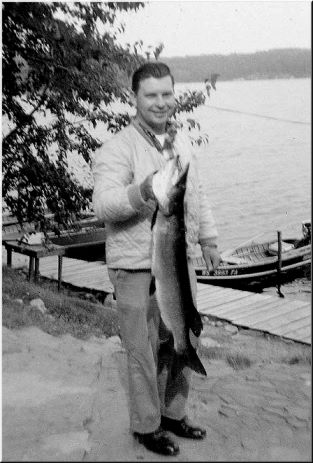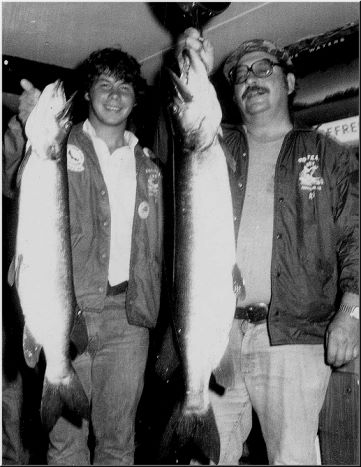Ronald Edward Dettloff, born on
January 15, 1932 in Chicago, Illinois, became interested in
fishing at an early age. In fact, when he was a teenager, Ron
was a tournament caster, placing high in various Chicago area
casting competitions in 1948 and 1949. After getting out of high
school in 1950, Ron went into the sheet metal trade, earning his
journeyman’s card and becoming a layout man for various Chicago
area sheet metal shops until moving to Wisconsin. In 1953, he
married Pat Wilmsen, and together they had two boys, Bob and
John.
 Ron first
came to the Chippewa Flowage quite by chance. It was in 1956,
and Ron, Pat, and her brother Lee, were on their way home from
an unsuccessful Canadian fishing trip. As they were passing
through Hayward, they noticed the odometer on their car read all
sevens. They took it as an omen that they should stop, so they
stayed at Squaw Bay Lodge on the Chippewa Flowage for a couple
days.
Ron first
came to the Chippewa Flowage quite by chance. It was in 1956,
and Ron, Pat, and her brother Lee, were on their way home from
an unsuccessful Canadian fishing trip. As they were passing
through Hayward, they noticed the odometer on their car read all
sevens. They took it as an omen that they should stop, so they
stayed at Squaw Bay Lodge on the Chippewa Flowage for a couple
days.
The catching of Ron’s first legal
musky was also by chance. He was walleye fishing in Rest Lake,
in the Manitowish Waters, in 1962 when an 11¼ pound musky nailed
a northern that had grabbed his minnow. The northern came off,
but the musky ended up getting hooked. The following year, Ron
caught a 19 pound musky out of Oxbow Lake in northern Wisconsin
while fishing with the well known guide George Bazso. Not
knowing that it was legal to shoot muskies at the time, Ron
nearly jumped out of his skin when Bazso pulled out a gun and
shot his musky once he got it up to the boat.
In 1964, Ron returned to the Chippewa
Flowage, staying at Indian Trail Resort to try his hand at the
musky fishing there. On that trip, he caught his first musky out
of the Flowage, on the Grass Patch on the Church Burs. Ron and
his family became regulars at Indian Trail after that, with Ron
boating muskies nearly every year from then on.
In August of 1966, Ron was on his way
out to go fishing one morning when Walt Roman and Frenchy LaMay,
two of the resort’s regular musky men, told him not to bother to
go out because the fishing had been tough. Even so, Ron came
back in with a nice 15 pounder that he had caught on Little
Kanachkey, and that was all Walt and Frenchy needed to see to
get them back out on the water with renewed vigor.
In 1967, Howie and Wanda Hornewer, the
owners of Indian Trail, approached Ron and Pat Dettloff to see
if they would be interested in purchasing the resort, but they
declined because they felt their two boys were too young. Pat’s
brother, Lee Wilmsen, ended up buying the resort though, keeping
it for four seasons until selling it to Ron and Pat in 1972.
During the years that Lee owned the
resort years, Ron was able to wrangle three to four weeks
vacation up on the Flowage each year, fishing not only for
musky, but also for crappie and bass with great success. He was
so successful that Lee would tell his new guests to follow the
guy wearing the red hat (Ron) in order to find out where to
fish. Ron eventually caught on and started wearing different
colored hats while out in the boat.
Adolph Sakowicz, one of the resort
regulars, caught his biggest musky, a 23¼ pounder, while fishing
with Ron during the Fourth of July week of 1968. They were
fishing on Weedy Shore, near the small grass patch that used to
be there, where Ron had previously seen a huge musky that may
have gone 40 pounds. A short time later, Ron spotted a wake
behind Adolph’s black Globe and said, "Watch out, here he
comes!" The fish nailed his lure and Adolph was into a big one.
Although it wasn’t the big one Ron had seen, it was a trophy
fish nonetheless.
 The first
year the Dettloffs operated Indian Trail Resort (1972), Ron
musky fished nearly every evening, pounding the water with gusto
well into the night. In fact, Ron was one of the first musky men
at the Trails who fished late at night with any regularity,
producing a number of nice fish after dark. That June, he caught
a 24¼ pounder at eleven o’clock at night on Grampa’s Patch on
East Cranberry. After the musky blasted Ron’s Creeper, it leaped
out of the water with so much power that it flew through the air
for the entire length of the boat before touching down back into
the water. Naturally, such exciting experiences only heightened
Ron’s desire to going fishing.
The first
year the Dettloffs operated Indian Trail Resort (1972), Ron
musky fished nearly every evening, pounding the water with gusto
well into the night. In fact, Ron was one of the first musky men
at the Trails who fished late at night with any regularity,
producing a number of nice fish after dark. That June, he caught
a 24¼ pounder at eleven o’clock at night on Grampa’s Patch on
East Cranberry. After the musky blasted Ron’s Creeper, it leaped
out of the water with so much power that it flew through the air
for the entire length of the boat before touching down back into
the water. Naturally, such exciting experiences only heightened
Ron’s desire to going fishing.
Later that fall, on Labor Day, Ron
caught his biggest musky ever, a 31¼ pounder on a yellow Globe
on Little Pete’s Bar. It was a choppy, overcast, cool evening
when he tied into the fish. Although the fish seemed to be well
hooked, having four small treble hooks buried in its jaws, after
Ron worked the fish closer to the boat–just out of netting
range–the musky suddenly held its ground and began shaking its
head. Much to his horror, Ron noticed the big musky slowly begin
to dislodge each hook, until only one treble was all that
remained. Luckily, Ron was able to muscle the fish close enough
to the boat to net, and he got it.
Well-known for his long, powerful
casts, Ron put so much torque on his equipment when casting that
he would rock the boat on a cast and, more than once, snap in
half good
musky rods in the process. One time,
Ron was cut off by another guide on Little Pete’s Bar, so before
the guide got to the weedbed that Ron was working towards, he
fired off a fifty plus yard cast with an Eddie Bait, made a few
jerks, and Wham! He caught a nice 15 pounder right out from
where the guide was heading. To add insult to injury, Ron asked
the guide to net the fish for him, which he did.
September 28, 1980, was a very
memorable musky day for Ron Dettloff. The entire month of
September of that year had been quite warm, making for
consistent surface bait fishing right through early October.
After getting fired up by a 37½ pound beauty that Wayne Gutsch
had guided one of our resort guests to that morning, my dad took
his fishing friend, John Carbine, out that evening to get in on
some of the great fishing.
At around six o’clock that evening, my
dad caught a 30-pounder on his black Hawg Wobbler while working
a shallow, gravel point called Ear Point. On the very first cast
he had made into the spot, he was slowly chugging his lure along
when the musky nailed it. Luckily, he had just retied his knot
before locking horns with that musky. The fish was really hyped
up, making two long powerful runs that strained my dad’s tackle
to its limit.
Once they got the fish into the net,
it went wild in the bag and exploded the plastic yoke of the
net. The two men had to think fast, so they hauled the fish into
the boat by grabbing the rim of the net. We all learned an
important lesson that night: never lift a big fish into the boat
using only the handle of the net. Grab near the yoke of the net
with one hand and the rim of the net with your other hand when
preparing to haul a heavy fish into the boat.
One huge musky, at least in the forty
pound class, blasted Ron’s Globe so hard late one night, in June
of 1983, on East Cranberry, that the explosion was heard by
another fisherman a couple of hundred yards away. Ron had the
fish up to the boat three different times and tried to net it;
however, it took off on one final run and the bait came free and
the fish got off. Later that fall, he guided John Carbine to a
34½ pounder in the same area.
Over the years, Ron Dettloff has had
great success while out on the waters of the Chippewa Flowage.
He has put close to 100 legal muskies into the boat; he has
caught impressive stringers of crappies in his day; and in
October of 1976 he once caught two 9 pound walleye in one day.
Because of health issues, he hasn’t fished muskies for himself
much during the past ten years; most of Ron’s time on the water
is now spent fishing for walleye.
Ron passed away on October 15,
2017.